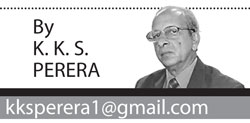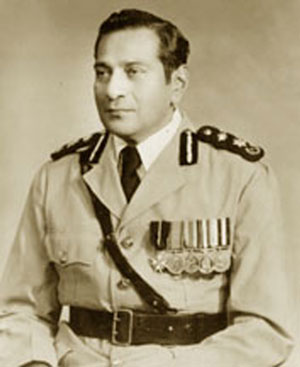Reply To:
Name - Reply Comment
 Rosy Senanayake recently sworn in as the Mayor of Colombo at Temple Trees, officially assumed duties as the first-ever Mayoress of the CMC on Thursday at a ceremony attended by MP Ravi Karunanayake among other guests.
Rosy Senanayake recently sworn in as the Mayor of Colombo at Temple Trees, officially assumed duties as the first-ever Mayoress of the CMC on Thursday at a ceremony attended by MP Ravi Karunanayake among other guests.
Bernadine Rose, “…which we call a rose by any other word would smell as sweet..” , is a former beauty queen is also an activist, who served as HC for Malaysia and was a benevolent Ambassador for the UNPF. She won the first Mrs World competition in 1985; Miss Asia-Pacific International 1981, and Miss Sri Lanka 1980.
However, it is little known that with only a two-year break in 1954, in the UNP held Council, when the LSSP won the election and Dr N. M. Perera accepting the esteemed position as holder of ‘Key to the City’, Vivien Gunawardene was privileged to be the first ‘acting’ female Mayor on a few occasions.
Rose spent her childhood in the harsh surroundings of Embilipitiya and Ampara, that she realised the adversity suffered by the deprived and the neglected.
Evidence before the Presidential Commission of Inquiry on Bond Issuance referred to Ravi and Rosy for their alleged roles.

However, the Commission recommended charging only Ravi K. Rosy rejected the unproven allegations.
A Civil Servant’s daughter, Rose was educated at Ferguson High School, Ratnapura, where the tiny-tot Sirimavo B attended too-half a century before.
Ravi Karunanayake, who played a leading role in the campaign to make Rosy the first woman Mayor and Rosy are two of Colombo’s UNP stalwarts, who are in the limelight for different reasons.
Rosy married Athula, son of former IGP ‘handsome’ Stanley Senanayake and beautiful Maya, the daughter of P. de S. Kularatne, educationist and MP, all of whom played leading roles in the 1962 saga that the readers would follow.
On January 27, 1962, Ravi’s maternal grandfather Cyril Cyrus Dissanayake [Jungle] DIG had been troubled since the afternoon’s meeting with his loyal subordinate Stanley Senanayake SP-Colombo who later became Rosy’s Father-in-Law.
The dissentient attitude of Stanley made him anxious about the planned conspiracy to topple the Government, which had been scheduled to take place within 12 hours.
While he was contemplative on alternatives an informant advised him on Government authorities sensing something foul happening and also on the possibility of an attempt by a group of military officers creating an ‘unrest’.
He took a Senior Police Officer with him and met four other partners in the plot, namely,
Colonel Fredric C de Saram OBE, Army Volunteer Force- Commanding officer- Artillery, Colonel Maurice de Mel, Commdt. - (Volunteer) & former Chief of Staff Army, Rear Admiral (Rtd) G Royce de Mel, MBE, Navy ADC (brother of Maurice -compelled to retire), Sydney Godfrey de Zoysa, Police- Former DIG, at a private residence situated close to the present Marine Drive in Wellawatte.
They had engaged in a crucial round of talks focused on the possible risks of going ahead with the scheme due to unexpected developments that arose at the last moment.
After a lengthy debate discussing ‘pros and cons’ of going ahead with the planned attempt, they dispersed around 9.45 p.m.
What exactly transpired at this meeting as well as the exact venue remains a mystery to date; though some writers believe the ‘top five’ finally made up their mind to abandon the coup d’état. However, at the trial, the prosecution took up the position that the operation was called off before the arrests were made.
ROLE OF ‘JUNGLE’
CCD, ‘Jungle’, the national athlete, and young probationary ASP, was selected by the British Intelligence during the World War II to be a member of their ‘underground’ in the event the island falls to Japanese following Burma and Malaysia in 1942. He became an immensely popular officer especially after gaining independence in 1948, and unlike his colleague Sydney, he had no perceptible cause for involvement apart from ‘class consciousness’ that rose to the zenith during the ‘transition times’ of ‘1956-62; with the pendulum swinging from the ‘Elite’ to Common Man.
The defence did not argue on this basis but was considering the possibility of obtaining an acquittal order on the strength of prosecution submissions.
The three learned judges at the Trial-at-Bar delivered their verdict quoting a British SC judgment, The Queen vs Aspinall -1876, which said,
“…The essence of the conspiracy is the agreement to do the unlawful acts alleged: but it is not necessary that any act should take place in pursuance of the agreement whether a criminal act is done or not, the agreement, and not the act, is what is penalized. ‘The conspirators may repent and stop, or they may have no opportunity, or may be prevented, or may fail. Nevertheless, the crime is complete and was complete when they agreed.’ –-Queen vs Liyanage - New Law Reports203, 204.
Eleven suspects including C.C. Dissanayake was sentenced to ten years Rigorous Imprisonment plus confiscating of all assets.
The eleven defendants convicted appealed to the Judicial Committee of the Privy Council, the UK in April 1965, and it held that the retrospective effect of the Special Act passed in Parliament was ‘ultra vires’ and invalid, the convictions cannot stand
The role played by Handsome: Rosy’s F-in-L
The civilian IGP Abeykoon was playing Bridge at the Orient Club at Guildford Crescent when P. de S. Kularatne, MP and father-in-law of Stanley contacted him to convey that a group of senior officers from the military and Police had been conspiring to stage a coup.
The operation was scheduled to take place just about midnight the same day it said. The IGP immediately advised S. A. Dissanayake DIG, to summon Stanley for an immediate discussion.
Here, Stanley code-named Handsome, by the plotters for his good looks, revealed that there was a plan to overthrow the Government that night, and went on to elaborate on information that he had in his possession, including what he gathered from C.C. Dissanayake at the Galle Face Green in the morning and at his official residence in the afternoon.
Stanley, as promised, visited his superior, C.C. Dissanayake, at his official residence at Longden Place, Colombo 7 that afternoon.
ASPs Terry Wijesinghe and Lionel Edirisinghe had just left after receiving final and individual briefings.
CC spoke more seriously to Stanley.
“Senanayake, I will continue what I told you this morning…for good reasons, I brought you into this only this morning. At 2200 hrs I will issue the Take Post Order. I want the Colombo Police to clear all thoroughfares by 2230 hrs. Bede Johnpillai (ASP Traffic) should be in charge of that operation. Col F. C. de Saram will move his troupes and armoured columns swiftly commencing 2300 hrs. By 1.00 hours all military operations will be completed and the Governor-General will dissolve Parliament and remove Prime Minister from office…This coup will be absolutely bloodless, repeat, absolutely bloodless, exactly what General Ayub Khan did in Pakistan, a few years ago. Therefore none of my gazetted officers will wear even side arms tonight…”
Stanley replying to his superior officer said, “Sir, May I now reiterate what I told you at Galle Face this morning when for the first time you asked me to join your coup. I am totally opposed to a democratically elected Government being overthrown by a Coup d’e`tat, be it bloodless or otherwise, be it run by gentlemen or otherwise”
Stanley belonged to the minority section of Buddhist officers in the Police Department.
He entered the University in the early forties, read for a Degree in Arts, and joined the Police Service as an ASP.
In the morning of January 27, as usual, Stanley met his boss CC at the Galle Face Green where CC Dissanayake for the first time briefed him on the conspiracy.
The reason for Stanley not being told until the last moment was, probably due to Stanley’s connections with P. de S. Kularatne, who was a staunch Buddhist leader and former Principal of Ananda College, and a Parliamentarian too.
His loyalty to his boss C.C. Dissanayake was never in doubt. Instead of making an immediate commitment, he asked for time to consider.
Stanley’s wife, Mayawati Jean Senanayake, nee Kularatne, was a mother of three kids, the oldest being Athula, 12 years, (Who later married Rosy).
On the day in question, Maya noticed that Stanley was acting strangely, and he was not himself. On being questioned persistently, he had disclosed the plans for a violent takeover of Government by his colleagues and superiors. It took her only a few seconds to realize the severity of the looming disaster; as she was determined to convey the news to her father, P de S. Kularatne.
Arrests of Participants
There were ample evidence to say that the State investigators led by Minister Felix Dias Bandaranaike and SA Dissanayake DIG, CID, the twin brother of CC ensured, deployment of only airmen and a selected group of sailors in the arrests of suspected officers and in particular the Army and Police were left out of the operation as much as possible for obvious reasons.
There wasn’t a single airman involved in the conspiracy as per the evidence surfaced up to this point.
After the Orient Club meeting, IGP Abeykoon, DIG SA Dissanayake and Stanley Senanayake decided to brief Deputy Minister of Defence, Felix Dias Bandaranaike, on the latest developments and hurried to his residence at Mahanuge Gardens, Kollupitiya.
After the initial briefing by Stanley Senanayake, Felix Dias lost no time in getting cracked.
He moved into action swiftly and determinedly.
The accused conspirators were arrested and dispatched to a special section called the Magazine Section of the Welikada Prison and were kept in solitary confinement guarded by a special security detachment under Major A Hulangamuwa [The composite guard from the Ceylon Light Infantry].
The writer had the privilege of personally ‘interviewing’ (A casual chat) with Maya Senanayake, the wife of Stanley Senanayake, former IGP who was Superintendent of Police, Colombo in 1962.
It was in the latter part of March 1967, that Mrs Mayawati Jean Senanayake nee Kularatne, was manageress at her father, P de S Kularatne owned Publishing House in Clolmbo 10.
As a trainee auditor attached to a firm of Chartered Accountants, the writer was a member of a team assigned to do an audit of the accounts of the business under Swadeshi Publishers.
In the course of the conversation, she gave specific details of the series of unique events that followed at their residence on that historic Saturday: to be precise, January 27, 1962.
The eleven defendants convicted appealed to the Judicial Committee of the Privy Council, the UK in April 1965, and it held that the retrospective effect of the Special Act passed in Parliament was ‘ultra vires’ and invalid, the convictions could not stand.
All eleven accused who conspired to take over the Government were freed.